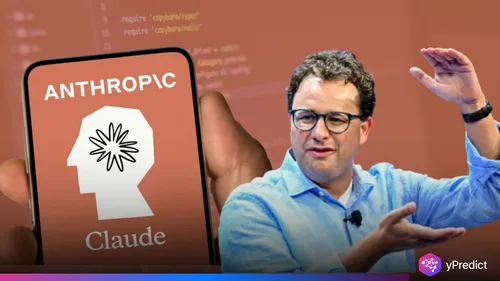
Dario Amodei, the head of Anthropic, mentioned Claude writes code for most of the work done at the company. He says Claude now accounts for 70-90% of the code produced at Anthropic. This doesn’t mean engineers are being replaced, though it does mean their work is changing significantly. Amodei described this change as engineers moving from traditional coding to a much more strategic role.
Instead of producing each line of code manually, engineers are more akin to managers, directing AI systems, post-processing its output, and making sure it produces trustworthy technology. This transition may sound futuristic, even science fiction-like, but Amodei asserted that the context of it feels very much the same when working. This is the speed at which AI engineering is evolving.
What may have once seemed like a distant vision is now working its way into the patchwork of workflows in leading AI companies. Engineers are relearning their craft in this new environment, trying to account for AI models like Claude becoming the primary way for how today’s software is constructed.
Claude’s Growing Role in Software Development
The statement that Claude writes code for most of Anthropic’s needs is a substantial one. Writing code has long been one of the most human intensive aspects of technology development, and now Claude can compose, debug and iteratively improve complex software. In writing, composing, and reviewing the bulk of repetitive and technical work, Claude frees human engineers to turn their attention to higher-order decision-making.
Instead of spending untold hours on primitive, manual coding, engineers partner with Claude and function as team members: co-writing prompts, screening code quality, and identifying project constraints. This role shift evidences a larger trend of AI as a co-pilot in the technical workforce, rather than a total replacement.
Engineers as Managers of AI Systems
Amodei stressed that the role of engineers remains vital, even though Claude writes code more efficiently than humans. Rather than becoming obsolete, engineers have taken on the responsibility of guiding AI behavior. They ensure that Claude follows best practices, maintains security standards, and aligns with organizational goals.
In many ways, this change mirrors broader workplace shifts happening across industries. AI engineering roles are less about execution and more about leadership, strategy, and oversight. Engineers who can effectively communicate with AI systems, troubleshoot errors, and shape AI-generated outputs are becoming indispensable.
Why the Future Feels Ordinary, Not Sci-Fi
Amodei characterized the act of using Claude in one’s job as “sci-fi” in theory and “ordinary” in experience. This observation is indicative of the paradox of tech adoption. When people think about a future with AI, they tend to expect grandiose, world-changing moments. Change typically exists in integration into daily workflows, and extraordinary happenings become ordinary tools.
This is what happened with Claude, a program developed at Anthropic that codes. The thought of AI coding most of a company’s code sounds futuristic, but in practice it feels like merely an enhancement in productivity. Engineers and AI systems are side by side, and iterations are eased and sped up, and innovation benefits from both mediums.
The Broader Implications for Work and Technology
Anthropic illustrates the direction in which coding is heading. If AI will take over 70 to 90 percent of software development, it’s easy to see the same transformation taking place in other industries. In industries from marketing to finance, AI tools are about to take care of more technical tasks, allowing us humans to play to our strengths of creativity, leadership, and problem-solving.
This trajectory does not indicate that human jobs are to be supplanted, but that they are to be adapted. Engineers at Anthropic are not losing their jobs; they are restructuring them. The same future may soon be in store for many of the rest of us facing the development of intelligent systems.
Final Thoughts
The fact that Claude writes code for many of Anthropic’s projects provides insight into the changing nature of work. Engineers are not going away; they are moving into jobs where supervising and verifying the AI and determining results will be central to the role.
As Dario Amodei said, the future feels mundane when it gets here. What felt like a vision of science fiction is now a practical reality occurring daily. The future of coding is coexisting with AI and humans in a partnership that resets productivity and creativity..






